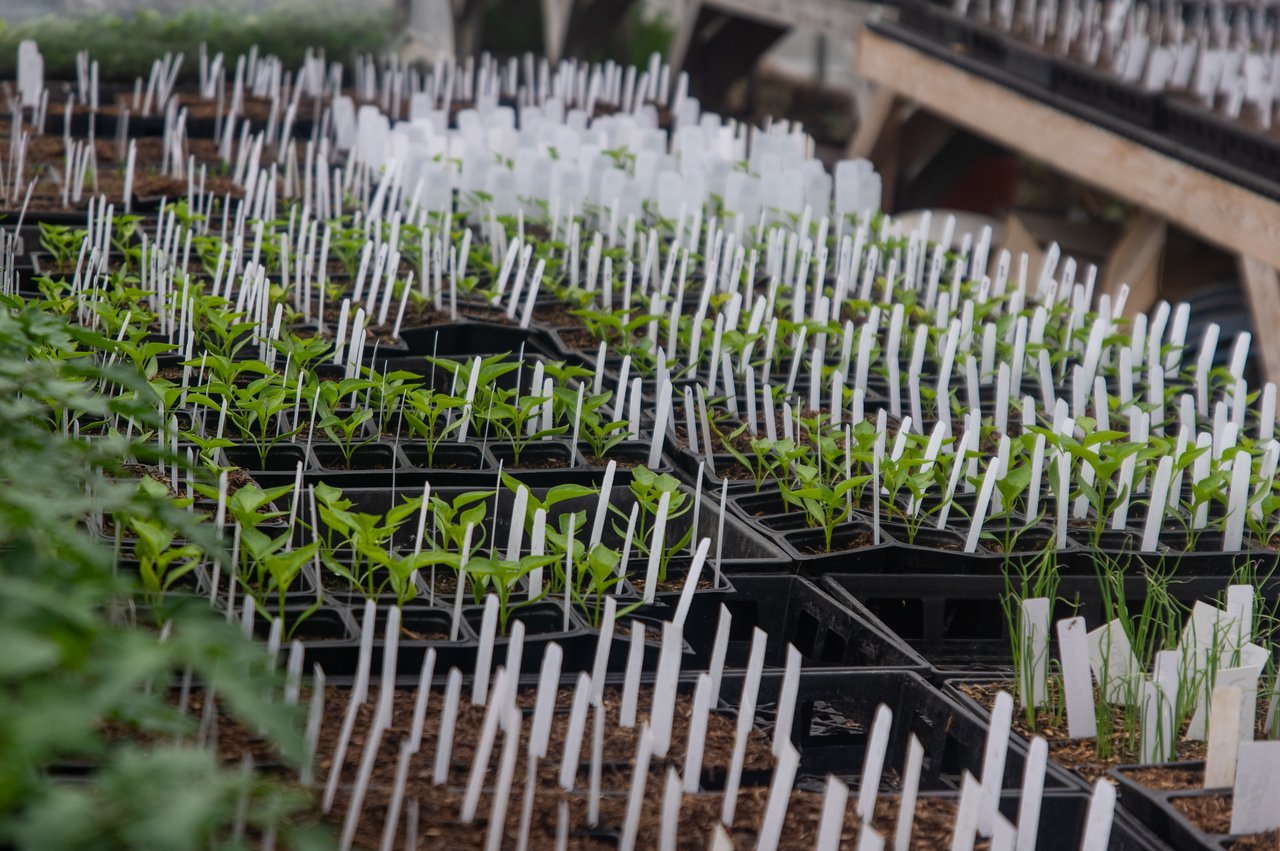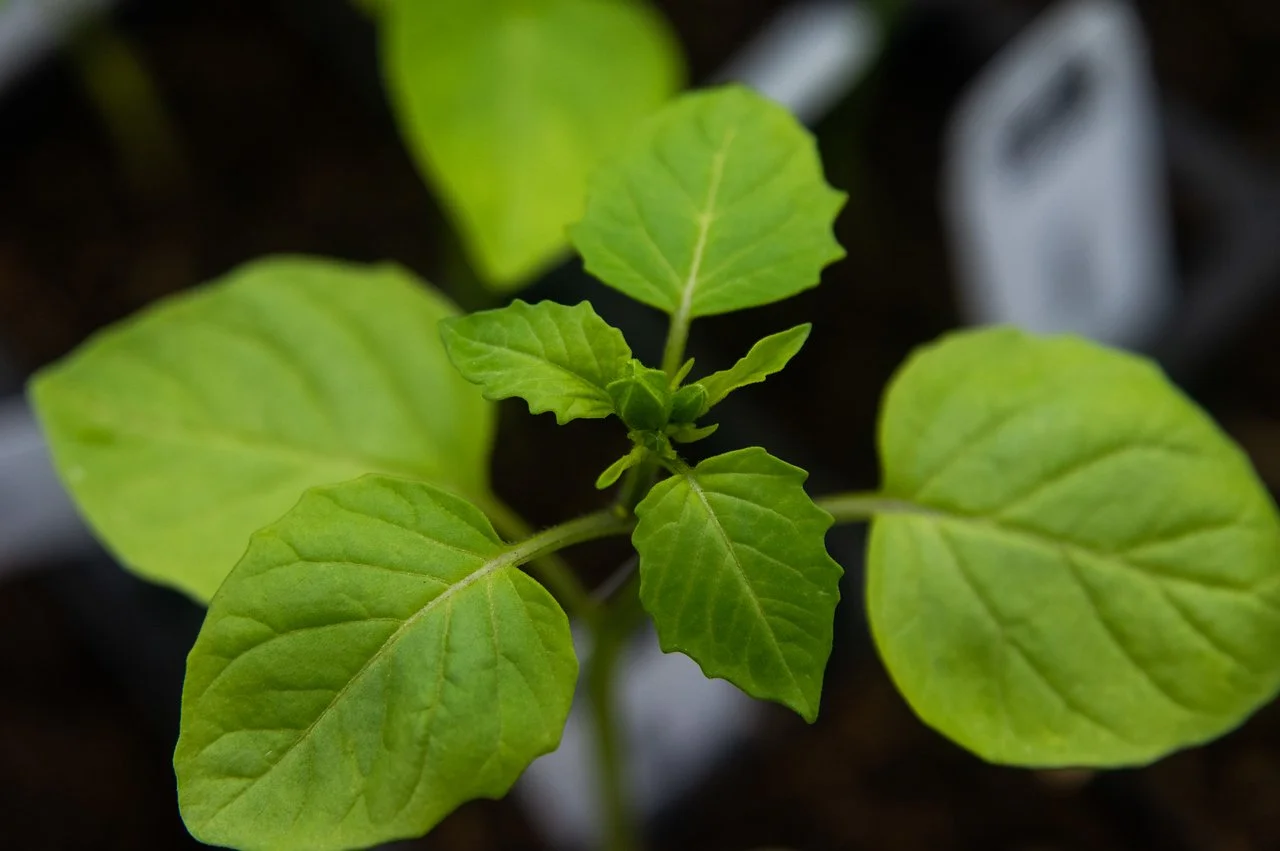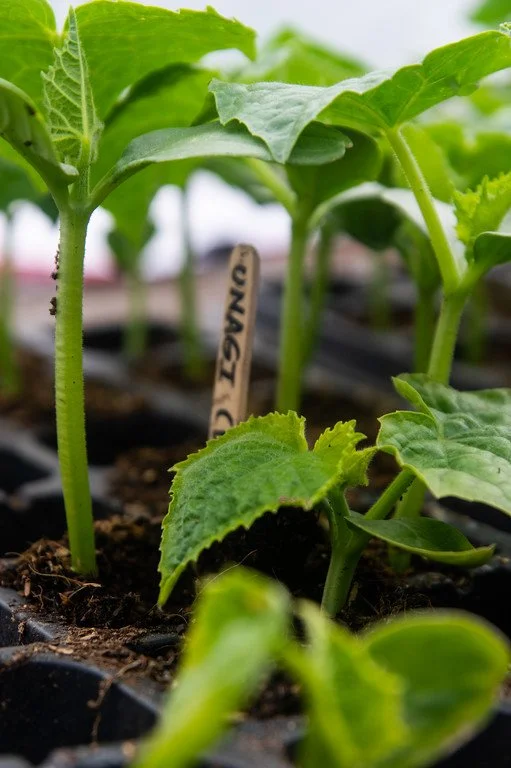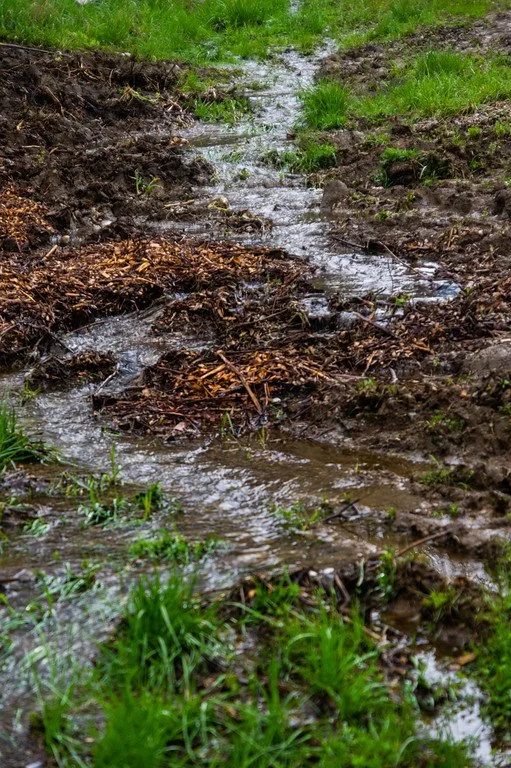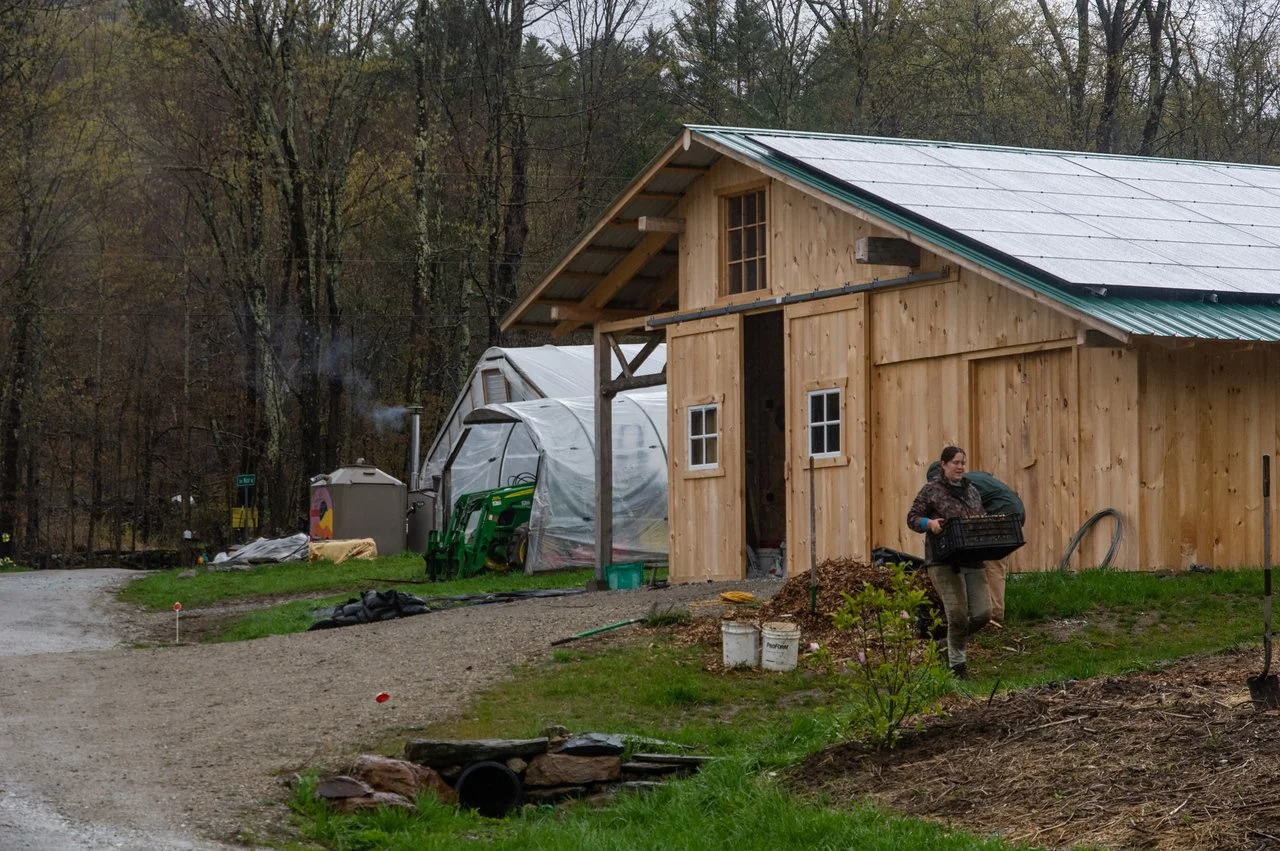11th Week of the Spring CSA season: Week of May 10th
next round of tunnel tomatoes on the left, pre-ordered plants on the right, photo by Adam Ford
This Week’s Availability
This week we will have red radish bunches, spinach, green curly kale, scallions, flowering kale “raab,” baby chard, parsley, red beets, chioggia beets, carrots, onions, daikon radishes, watermelon radish, kohlrabi, yellow potatoes, and the first few plants for your garden: oregano, thyme, and sage. (More will start getting ready over the next few weeks.)
Read the “farm news” section below to learn about where the salad greens are this week.
Flowering kale “raab” is a delicious, fun, spring treat. We harvest the tender shoots, flowers, and leaves of the kale plants right before they go to flower as they put energy into setting seed. We cook with them like broccoli raab. A simple way to enjoy them as a side dish is sautéed with butter, garlic, a bit of lemon juice and salt… so good!
*carrots, onions, and beets are sourced from Juniper Hill Farm, also certified organic
Ordering closes at noon on Tuesdays for Wednesday bags, and at midnight on Wednesdays for Friday bags.
You do not need to fill out the form if you plan to come to the barn on Wednesdays or Thursdays to pick out your items yourself.
more starts! photo by Adam Ford
tomatillo, photo by Adam Ford
Farm News
It’s possible after looking at the availability list for this week, you may think: It’s hard for me to miss a week of baby lettuce or mesclun mix! I share that sentiment, you are in good company. This week we aren’t able to harvest baby lettuce or mesclun mix because it just isn’t big enough yet to have enough to cut for the week. We are in between plantings, and a variety of factors have made this situation arise this week: the lingering snow melt into early April this year, the cooler, wet weather recently, and the fact that we use the high tunnel spaces for spring and summer crops.
Running the spring CSA season is actually one of the harder seasons: we try hard to have a “salad mix” available each week, but as we keep harvesting things out the tunnel we need to immediately replace those harvested out crops with summer transplants to have early tomatoes and cucumbers. We rely on our earliest outdoor seedings to help us through this late April/early May tight spot for salad greens, but this year, we weren’t able to start seeding outdoors until almost two weeks later than we usually have been in recent years, as we waited for the last snow dump to melt from the fields. And the last week just hasn’t been that sunny to really help these “almost ready” greens get a growing boost. The perfectionists in us don’t enjoy that sometimes this break in salad greens happens, but then I am reminded that this is why we run a CSA program: to reflect to the community what seasonal crops can grow well at different parts of the year, and to get a window into the dance of balancing crop demands. For instance, we wouldn’t have a salad greens shortage this week if we didn’t also grow tomatoes for the early summer. And some farms do that: Some farms just focus on salad greens and some farms just focus on tomatoes. We grow over 80 varieties of veggies, and they are always competing for space! So this week I am going to enjoy cooked greens, raw rubbed kale salads, spinach salads, and hope for some sunshine to help the other greens get over the finish line.
Last week was another big seeding week, and potentially the last big, big seeding week for the spring season. We will continue to seed things weekly, but that was likely the biggest hump, and it feels fun to have that accomplished. The team spread wood chip mulch on all the paths for the pick your own flower garden. They also added a mulch layer to our young, eager blueberry bushes. We continued to do some transplanting when the rain finally stopped at the end of the week, starting with some early brassicas and then getting to dive into starting the onion transplanting. The team moved tarps around to new fields, removed old brassica stems from last year to prep for transplanting and moved rocks out of growing spaces. Katie kept doing rounds of direct seeding for the fast growing greens outside. Bryan and Cindy made big headway in building a new ramp into the barn. (The original one was rotting, needed some new boards, and a more accessible railing. As they took it apart they also found water issues at the entry way, so they needed to wrap flashing all the way around the floor of the sliding door to prevent that from continuing to happen.) They will add an overhang over the ramp to extend the life of this new ramp. They also finished the wiring in the new building, which is a real treat to have light in that work space now.
And finally, on a totally different note this week: Ryan read an article in the NOFA-VT newsletter about microplastics in commercial composting that was completely new information to both of us, and has kind of made my head explode. (He read the paper copy from the newsletter, and the one I linked above from VT Digger is slightly different, with less info on how this got approved at the state level. The article also links to an organization that provides more information on this topic.) The cliff notes of this story is that the composted produce that leaves large grocery stores do not have to be removed from their plastic packaging before being shredded up with the ingredients for compost. This shredded up plastic/food waste mess eventually makes it back onto agricultural fields. (Quick side note: NOT on certified organic farm fields, but even I, who is pretty diligent about only purchasing certified organic food for our family, still eat non-organic food items from time to time. And considering most humans don’t get to eat organic food, this is a big downer.) Crushing plastic up with food waste is not compost. It’s trash. It’s trash that has food waste mixed into it. And I am surprised that this was greenlit in Vermont. Sometimes I am impressed that with all the knowledge and science we have in 2023, we continue to make weird policy decisions that threaten the health of ourselves and our only home. So if this is also as surprising to you, consider contacting your legislator so we can start getting this policy updated.
Have a great week,
ESF Team: Ryan, Kara, Galen, Taylor, Cindy, Katie, K2, Vanessa, Bryan (and Sky and Soraya)
Weekly Recipe
There are so many kale salads to find on the internet, but this is one of our favorites.
cabbage transplants waiting for action, photo by Adam Ford
“outdoor greenhouse” for hardening off, photo by Adam Ford
Vanessa washing spinach, photo by Adam Ford
the kiddos picked out this sweet new magnolia for my birthday this year, and they were very excited to see it planted after coming home from school photo by Adam Ford
eager flower on that baby magnolia, photo by Adam Ford
Ryan taking a test drive on our (hopefully soon) newest farm tool: an electric golf card with a loading bed to move the harvest out of the field more quickly and with less diesel… right now we move harvest around with the tractor, and it just doesn’t need that big of an engine power for that job, and sometimes the tractor is busy with other work. But the brakes on the used cart the dealer brought over were shot. We were hoping to just test it to make sure it could move heavy veggies up our steepest field slope, and we were surprised the brakes were in such poor share since they said their shop looked it all over…. So back to the dealer it went for an actual tune up, and we will see if it comes back in quality enough shape to actually acquire. It will be cool if this pans out since we can charge it with our solar power! photo by Adam Ford
pretty lines, photo by Adam Ford
reminder now that the tunnel is screened in from bugs! photo by Adam Ford
Katie seeding, photo by Adam Ford
K2 bunching parsley, Molly cleaning scallions, photo by Adam Ford
we are cruising through our backup cucumber plants trying to keep up with the damage from rodents snipping the transplants off, photo by Adam Ford
quality control director, photo by Adam Ford
The team’s smiles when they learned what the “big surprise” was when the golf cart arrived to test out. When the tractor isn’t available for harvest, the team uses hand carts to move harvest from the fields to the wash station. This is hard work when you are moving hundreds of pounds of veggies by hand up a slope. It keeps us in good shape, but is extra work on our farmer bodies we don’t need. So we have been planning this surprise for the team for awhile. When they heard we had a surprise, they assumed we were kidding, and something like a large moldy load of extra spikey straw was going to show up to unload, because that’s how we joke around here. These are the faces of people who realize that the surprise was actually something fun, and not spikey, moldy straw. photo by Adam Ford
Cindy wrapping up a project, photo by Adam Ford
Vanessa bunching parsley, photo by Adam Ford
thyme plugs that didn’t make the cut, photo by Adam Ford
springtime showers, photo by Adam Ford
going to weed whack around the bee yard, photo by Adam Ford
Molly moving wood chips, photo by Adam Ford
Echo meets Adam’s new dog, photo by Adam Ford
the birthday crown matched the ear protection that day, photo by Adam Ford


